ACC204: Corporations Law Assessment 2 - FWLP Shareholder Rights
VerifiedAdded on 2020/03/16
|9
|2024
|120
Homework Assignment
AI Summary
This document presents a comprehensive analysis of a Corporations Law assignment, addressing key issues related to shareholder rights and corporate finance. The assignment explores the legal implications of non-payment of dividends, assessing whether grandchildren of Galli can pursue action based on oppression provisions. It then delves into the benefits and requirements of share buybacks, considering their advantages for the company, particularly in mitigating potential liabilities arising from shareholder disputes. Finally, the assignment evaluates the alternative of capital reduction, comparing it to share buybacks and analyzing the procedures and considerations involved in reducing share capital, including shareholder consent and compliance with the Corporations Act. The analysis draws on relevant case law and statutory provisions, offering a practical application of legal principles to a real-world business scenario. This assignment provides a deep understanding of corporate law concepts in the context of financial decisions within a company, with a focus on the rights of shareholders and the legal framework governing corporate actions.

Paraphrase This Document
Need a fresh take? Get an instant paraphrase of this document with our AI Paraphraser
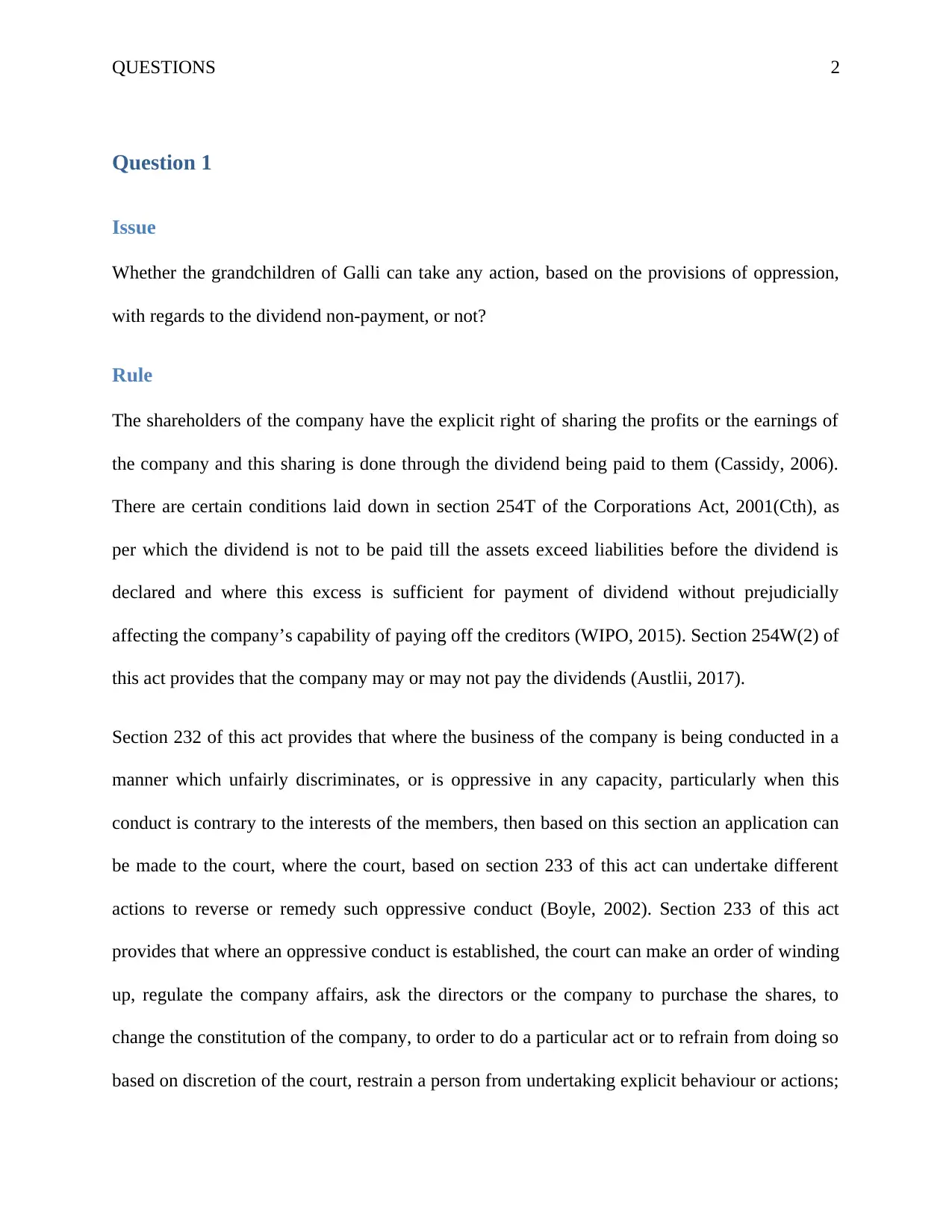
QUESTIONS 2
Question 1
Issue
Whether the grandchildren of Galli can take any action, based on the provisions of oppression,
with regards to the dividend non-payment, or not?
Rule
The shareholders of the company have the explicit right of sharing the profits or the earnings of
the company and this sharing is done through the dividend being paid to them (Cassidy, 2006).
There are certain conditions laid down in section 254T of the Corporations Act, 2001(Cth), as
per which the dividend is not to be paid till the assets exceed liabilities before the dividend is
declared and where this excess is sufficient for payment of dividend without prejudicially
affecting the company’s capability of paying off the creditors (WIPO, 2015). Section 254W(2) of
this act provides that the company may or may not pay the dividends (Austlii, 2017).
Section 232 of this act provides that where the business of the company is being conducted in a
manner which unfairly discriminates, or is oppressive in any capacity, particularly when this
conduct is contrary to the interests of the members, then based on this section an application can
be made to the court, where the court, based on section 233 of this act can undertake different
actions to reverse or remedy such oppressive conduct (Boyle, 2002). Section 233 of this act
provides that where an oppressive conduct is established, the court can make an order of winding
up, regulate the company affairs, ask the directors or the company to purchase the shares, to
change the constitution of the company, to order to do a particular act or to refrain from doing so
based on discretion of the court, restrain a person from undertaking explicit behaviour or actions;
Question 1
Issue
Whether the grandchildren of Galli can take any action, based on the provisions of oppression,
with regards to the dividend non-payment, or not?
Rule
The shareholders of the company have the explicit right of sharing the profits or the earnings of
the company and this sharing is done through the dividend being paid to them (Cassidy, 2006).
There are certain conditions laid down in section 254T of the Corporations Act, 2001(Cth), as
per which the dividend is not to be paid till the assets exceed liabilities before the dividend is
declared and where this excess is sufficient for payment of dividend without prejudicially
affecting the company’s capability of paying off the creditors (WIPO, 2015). Section 254W(2) of
this act provides that the company may or may not pay the dividends (Austlii, 2017).
Section 232 of this act provides that where the business of the company is being conducted in a
manner which unfairly discriminates, or is oppressive in any capacity, particularly when this
conduct is contrary to the interests of the members, then based on this section an application can
be made to the court, where the court, based on section 233 of this act can undertake different
actions to reverse or remedy such oppressive conduct (Boyle, 2002). Section 233 of this act
provides that where an oppressive conduct is established, the court can make an order of winding
up, regulate the company affairs, ask the directors or the company to purchase the shares, to
change the constitution of the company, to order to do a particular act or to refrain from doing so
based on discretion of the court, restrain a person from undertaking explicit behaviour or actions;
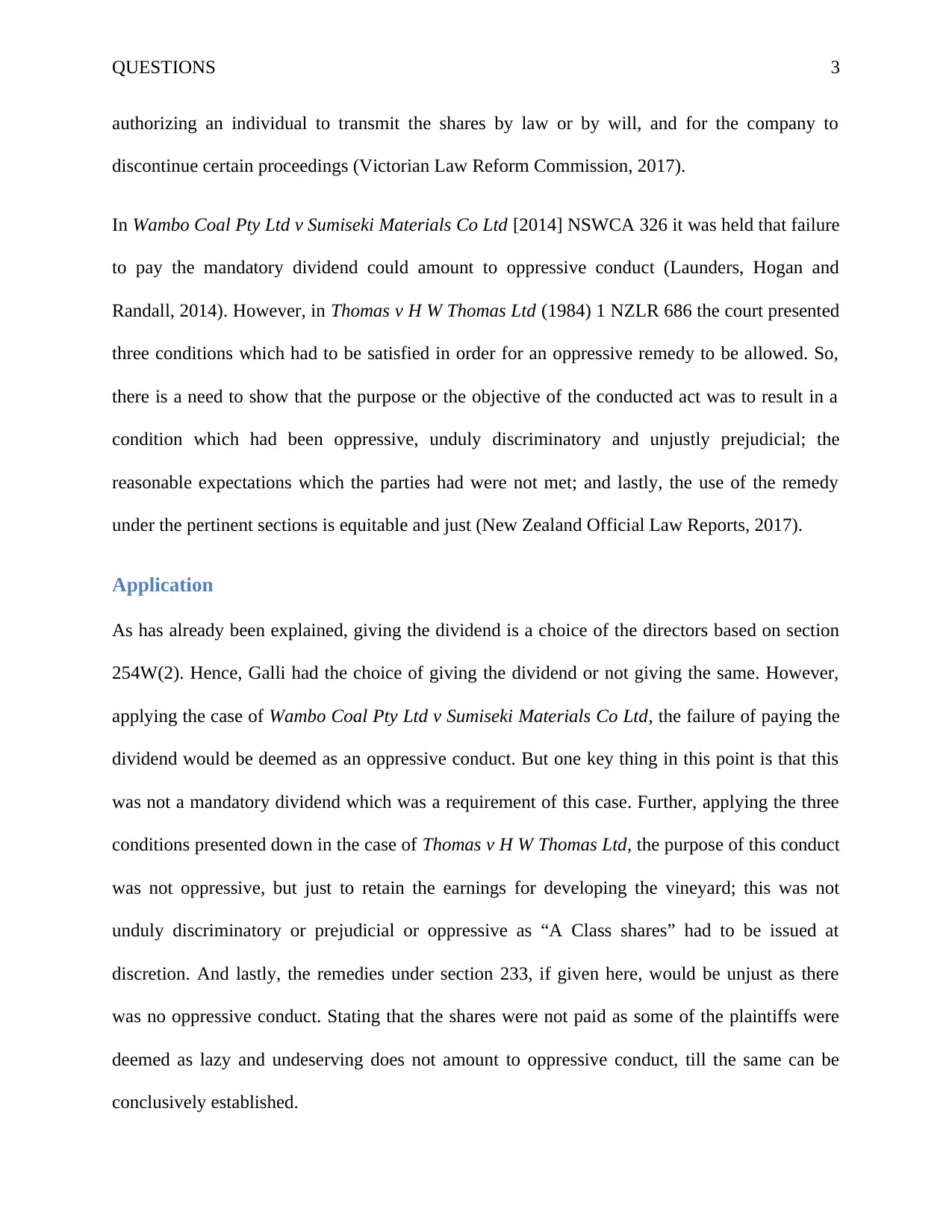
QUESTIONS 3
authorizing an individual to transmit the shares by law or by will, and for the company to
discontinue certain proceedings (Victorian Law Reform Commission, 2017).
In Wambo Coal Pty Ltd v Sumiseki Materials Co Ltd [2014] NSWCA 326 it was held that failure
to pay the mandatory dividend could amount to oppressive conduct (Launders, Hogan and
Randall, 2014). However, in Thomas v H W Thomas Ltd (1984) 1 NZLR 686 the court presented
three conditions which had to be satisfied in order for an oppressive remedy to be allowed. So,
there is a need to show that the purpose or the objective of the conducted act was to result in a
condition which had been oppressive, unduly discriminatory and unjustly prejudicial; the
reasonable expectations which the parties had were not met; and lastly, the use of the remedy
under the pertinent sections is equitable and just (New Zealand Official Law Reports, 2017).
Application
As has already been explained, giving the dividend is a choice of the directors based on section
254W(2). Hence, Galli had the choice of giving the dividend or not giving the same. However,
applying the case of Wambo Coal Pty Ltd v Sumiseki Materials Co Ltd, the failure of paying the
dividend would be deemed as an oppressive conduct. But one key thing in this point is that this
was not a mandatory dividend which was a requirement of this case. Further, applying the three
conditions presented down in the case of Thomas v H W Thomas Ltd, the purpose of this conduct
was not oppressive, but just to retain the earnings for developing the vineyard; this was not
unduly discriminatory or prejudicial or oppressive as “A Class shares” had to be issued at
discretion. And lastly, the remedies under section 233, if given here, would be unjust as there
was no oppressive conduct. Stating that the shares were not paid as some of the plaintiffs were
deemed as lazy and undeserving does not amount to oppressive conduct, till the same can be
conclusively established.
authorizing an individual to transmit the shares by law or by will, and for the company to
discontinue certain proceedings (Victorian Law Reform Commission, 2017).
In Wambo Coal Pty Ltd v Sumiseki Materials Co Ltd [2014] NSWCA 326 it was held that failure
to pay the mandatory dividend could amount to oppressive conduct (Launders, Hogan and
Randall, 2014). However, in Thomas v H W Thomas Ltd (1984) 1 NZLR 686 the court presented
three conditions which had to be satisfied in order for an oppressive remedy to be allowed. So,
there is a need to show that the purpose or the objective of the conducted act was to result in a
condition which had been oppressive, unduly discriminatory and unjustly prejudicial; the
reasonable expectations which the parties had were not met; and lastly, the use of the remedy
under the pertinent sections is equitable and just (New Zealand Official Law Reports, 2017).
Application
As has already been explained, giving the dividend is a choice of the directors based on section
254W(2). Hence, Galli had the choice of giving the dividend or not giving the same. However,
applying the case of Wambo Coal Pty Ltd v Sumiseki Materials Co Ltd, the failure of paying the
dividend would be deemed as an oppressive conduct. But one key thing in this point is that this
was not a mandatory dividend which was a requirement of this case. Further, applying the three
conditions presented down in the case of Thomas v H W Thomas Ltd, the purpose of this conduct
was not oppressive, but just to retain the earnings for developing the vineyard; this was not
unduly discriminatory or prejudicial or oppressive as “A Class shares” had to be issued at
discretion. And lastly, the remedies under section 233, if given here, would be unjust as there
was no oppressive conduct. Stating that the shares were not paid as some of the plaintiffs were
deemed as lazy and undeserving does not amount to oppressive conduct, till the same can be
conclusively established.
⊘ This is a preview!⊘
Do you want full access?
Subscribe today to unlock all pages.

Trusted by 1+ million students worldwide
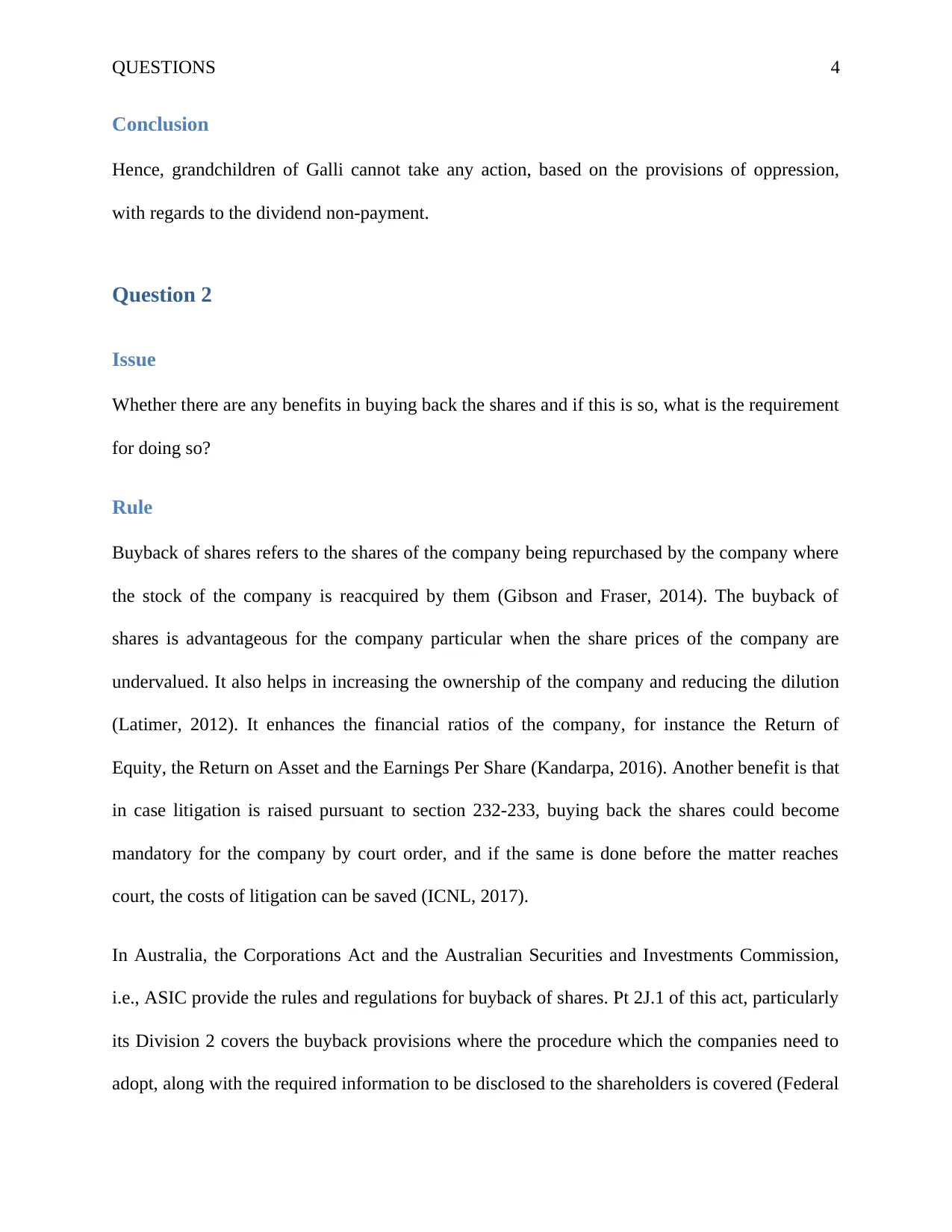
QUESTIONS 4
Conclusion
Hence, grandchildren of Galli cannot take any action, based on the provisions of oppression,
with regards to the dividend non-payment.
Question 2
Issue
Whether there are any benefits in buying back the shares and if this is so, what is the requirement
for doing so?
Rule
Buyback of shares refers to the shares of the company being repurchased by the company where
the stock of the company is reacquired by them (Gibson and Fraser, 2014). The buyback of
shares is advantageous for the company particular when the share prices of the company are
undervalued. It also helps in increasing the ownership of the company and reducing the dilution
(Latimer, 2012). It enhances the financial ratios of the company, for instance the Return of
Equity, the Return on Asset and the Earnings Per Share (Kandarpa, 2016). Another benefit is that
in case litigation is raised pursuant to section 232-233, buying back the shares could become
mandatory for the company by court order, and if the same is done before the matter reaches
court, the costs of litigation can be saved (ICNL, 2017).
In Australia, the Corporations Act and the Australian Securities and Investments Commission,
i.e., ASIC provide the rules and regulations for buyback of shares. Pt 2J.1 of this act, particularly
its Division 2 covers the buyback provisions where the procedure which the companies need to
adopt, along with the required information to be disclosed to the shareholders is covered (Federal
Conclusion
Hence, grandchildren of Galli cannot take any action, based on the provisions of oppression,
with regards to the dividend non-payment.
Question 2
Issue
Whether there are any benefits in buying back the shares and if this is so, what is the requirement
for doing so?
Rule
Buyback of shares refers to the shares of the company being repurchased by the company where
the stock of the company is reacquired by them (Gibson and Fraser, 2014). The buyback of
shares is advantageous for the company particular when the share prices of the company are
undervalued. It also helps in increasing the ownership of the company and reducing the dilution
(Latimer, 2012). It enhances the financial ratios of the company, for instance the Return of
Equity, the Return on Asset and the Earnings Per Share (Kandarpa, 2016). Another benefit is that
in case litigation is raised pursuant to section 232-233, buying back the shares could become
mandatory for the company by court order, and if the same is done before the matter reaches
court, the costs of litigation can be saved (ICNL, 2017).
In Australia, the Corporations Act and the Australian Securities and Investments Commission,
i.e., ASIC provide the rules and regulations for buyback of shares. Pt 2J.1 of this act, particularly
its Division 2 covers the buyback provisions where the procedure which the companies need to
adopt, along with the required information to be disclosed to the shareholders is covered (Federal
Paraphrase This Document
Need a fresh take? Get an instant paraphrase of this document with our AI Paraphraser
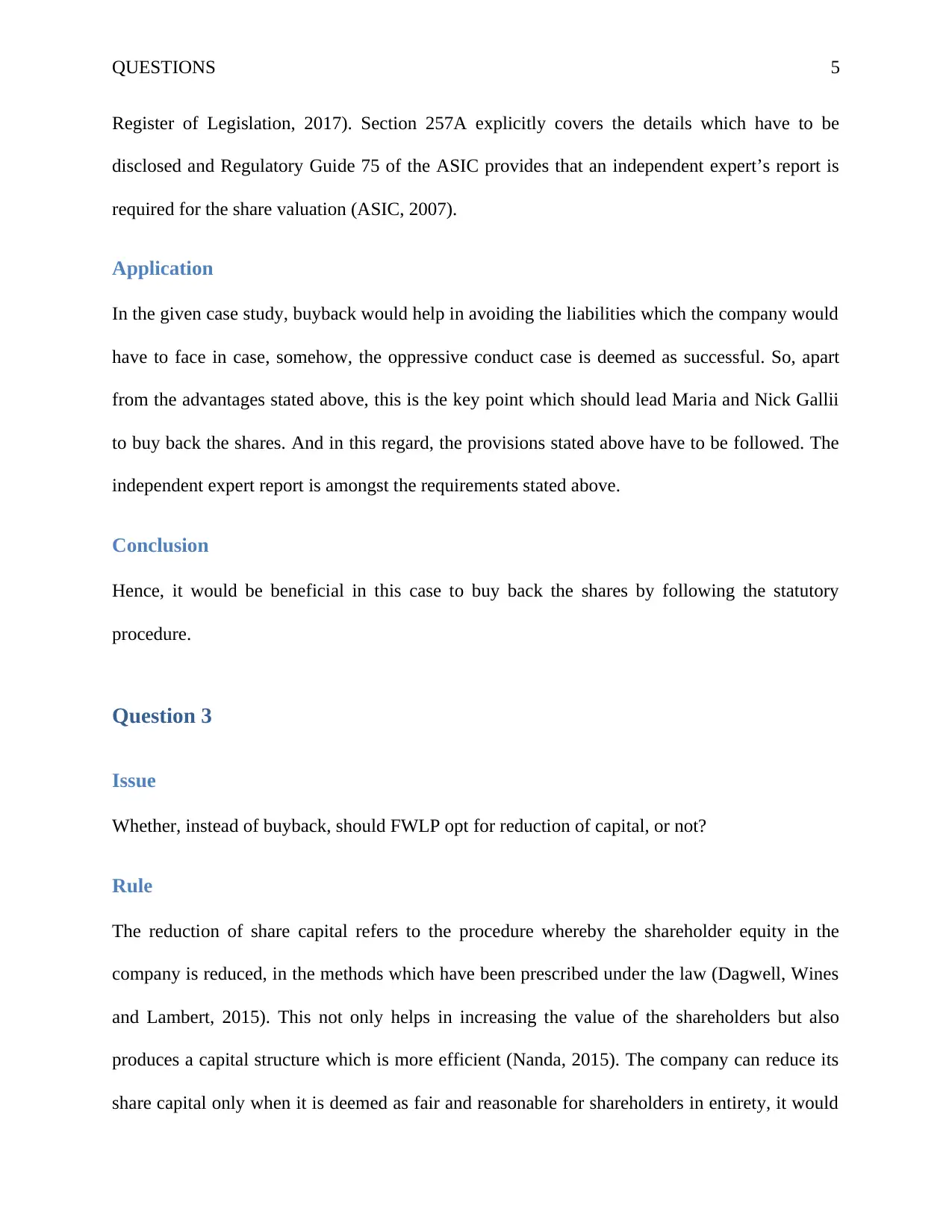
QUESTIONS 5
Register of Legislation, 2017). Section 257A explicitly covers the details which have to be
disclosed and Regulatory Guide 75 of the ASIC provides that an independent expert’s report is
required for the share valuation (ASIC, 2007).
Application
In the given case study, buyback would help in avoiding the liabilities which the company would
have to face in case, somehow, the oppressive conduct case is deemed as successful. So, apart
from the advantages stated above, this is the key point which should lead Maria and Nick Gallii
to buy back the shares. And in this regard, the provisions stated above have to be followed. The
independent expert report is amongst the requirements stated above.
Conclusion
Hence, it would be beneficial in this case to buy back the shares by following the statutory
procedure.
Question 3
Issue
Whether, instead of buyback, should FWLP opt for reduction of capital, or not?
Rule
The reduction of share capital refers to the procedure whereby the shareholder equity in the
company is reduced, in the methods which have been prescribed under the law (Dagwell, Wines
and Lambert, 2015). This not only helps in increasing the value of the shareholders but also
produces a capital structure which is more efficient (Nanda, 2015). The company can reduce its
share capital only when it is deemed as fair and reasonable for shareholders in entirety, it would
Register of Legislation, 2017). Section 257A explicitly covers the details which have to be
disclosed and Regulatory Guide 75 of the ASIC provides that an independent expert’s report is
required for the share valuation (ASIC, 2007).
Application
In the given case study, buyback would help in avoiding the liabilities which the company would
have to face in case, somehow, the oppressive conduct case is deemed as successful. So, apart
from the advantages stated above, this is the key point which should lead Maria and Nick Gallii
to buy back the shares. And in this regard, the provisions stated above have to be followed. The
independent expert report is amongst the requirements stated above.
Conclusion
Hence, it would be beneficial in this case to buy back the shares by following the statutory
procedure.
Question 3
Issue
Whether, instead of buyback, should FWLP opt for reduction of capital, or not?
Rule
The reduction of share capital refers to the procedure whereby the shareholder equity in the
company is reduced, in the methods which have been prescribed under the law (Dagwell, Wines
and Lambert, 2015). This not only helps in increasing the value of the shareholders but also
produces a capital structure which is more efficient (Nanda, 2015). The company can reduce its
share capital only when it is deemed as fair and reasonable for shareholders in entirety, it would
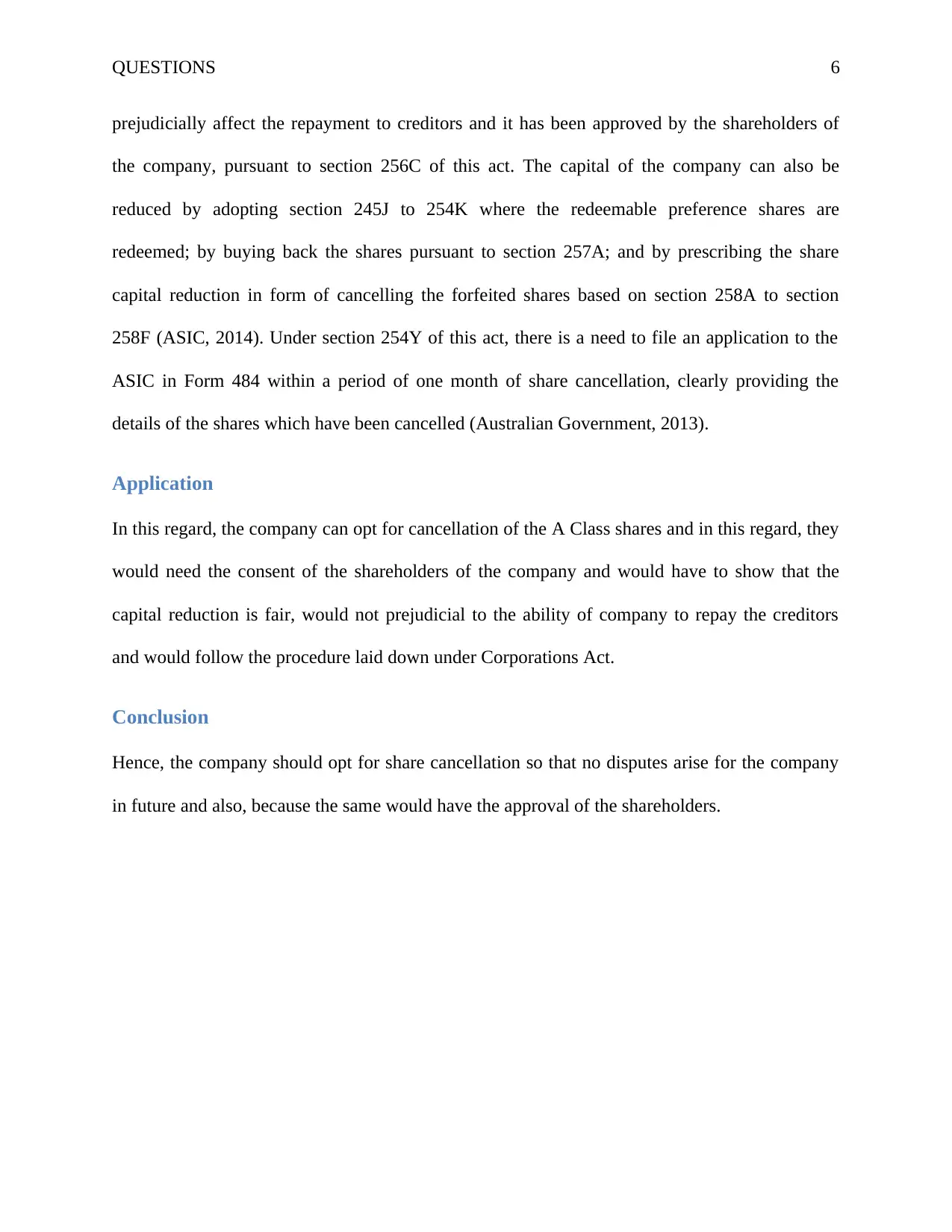
QUESTIONS 6
prejudicially affect the repayment to creditors and it has been approved by the shareholders of
the company, pursuant to section 256C of this act. The capital of the company can also be
reduced by adopting section 245J to 254K where the redeemable preference shares are
redeemed; by buying back the shares pursuant to section 257A; and by prescribing the share
capital reduction in form of cancelling the forfeited shares based on section 258A to section
258F (ASIC, 2014). Under section 254Y of this act, there is a need to file an application to the
ASIC in Form 484 within a period of one month of share cancellation, clearly providing the
details of the shares which have been cancelled (Australian Government, 2013).
Application
In this regard, the company can opt for cancellation of the A Class shares and in this regard, they
would need the consent of the shareholders of the company and would have to show that the
capital reduction is fair, would not prejudicial to the ability of company to repay the creditors
and would follow the procedure laid down under Corporations Act.
Conclusion
Hence, the company should opt for share cancellation so that no disputes arise for the company
in future and also, because the same would have the approval of the shareholders.
prejudicially affect the repayment to creditors and it has been approved by the shareholders of
the company, pursuant to section 256C of this act. The capital of the company can also be
reduced by adopting section 245J to 254K where the redeemable preference shares are
redeemed; by buying back the shares pursuant to section 257A; and by prescribing the share
capital reduction in form of cancelling the forfeited shares based on section 258A to section
258F (ASIC, 2014). Under section 254Y of this act, there is a need to file an application to the
ASIC in Form 484 within a period of one month of share cancellation, clearly providing the
details of the shares which have been cancelled (Australian Government, 2013).
Application
In this regard, the company can opt for cancellation of the A Class shares and in this regard, they
would need the consent of the shareholders of the company and would have to show that the
capital reduction is fair, would not prejudicial to the ability of company to repay the creditors
and would follow the procedure laid down under Corporations Act.
Conclusion
Hence, the company should opt for share cancellation so that no disputes arise for the company
in future and also, because the same would have the approval of the shareholders.
⊘ This is a preview!⊘
Do you want full access?
Subscribe today to unlock all pages.

Trusted by 1+ million students worldwide
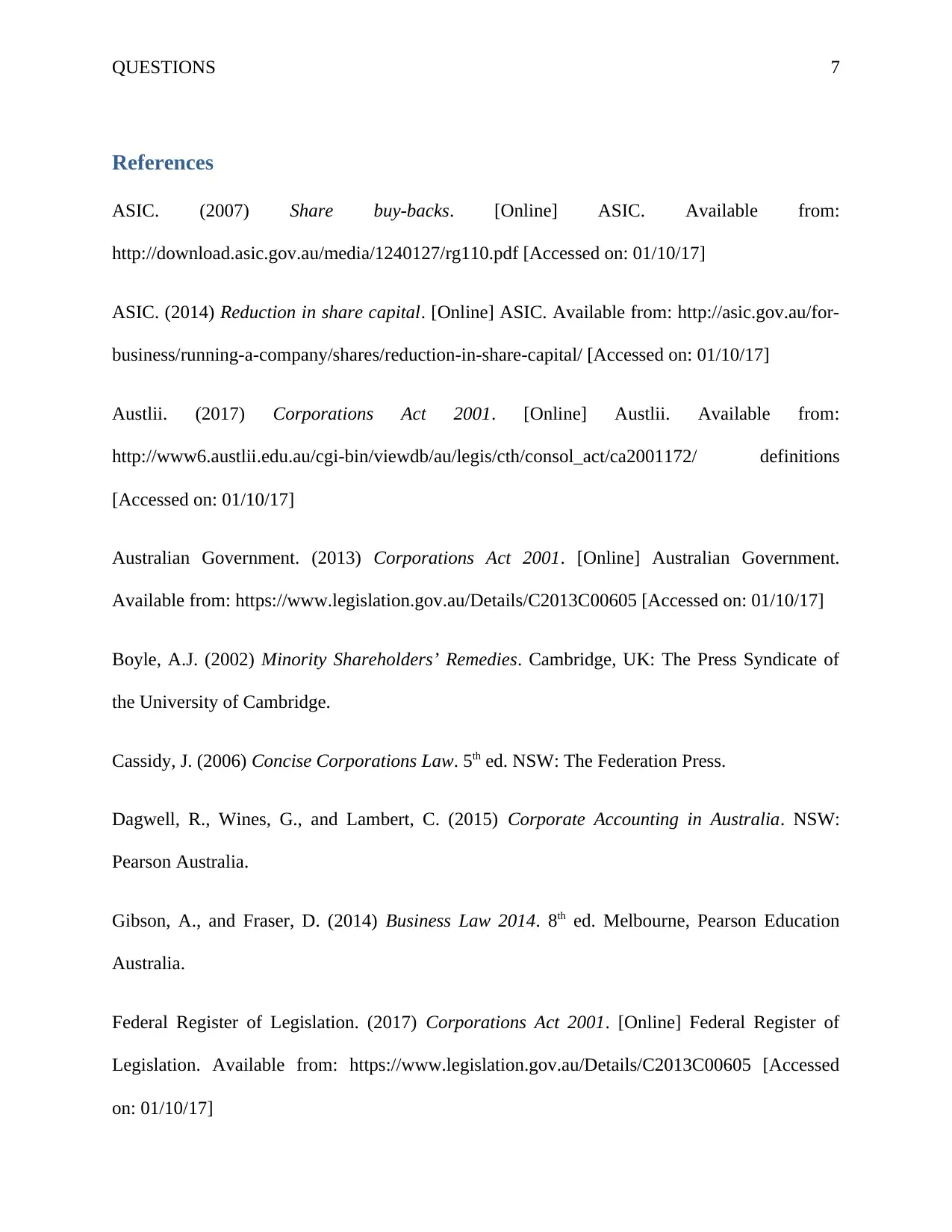
QUESTIONS 7
References
ASIC. (2007) Share buy-backs. [Online] ASIC. Available from:
http://download.asic.gov.au/media/1240127/rg110.pdf [Accessed on: 01/10/17]
ASIC. (2014) Reduction in share capital. [Online] ASIC. Available from: http://asic.gov.au/for-
business/running-a-company/shares/reduction-in-share-capital/ [Accessed on: 01/10/17]
Austlii. (2017) Corporations Act 2001. [Online] Austlii. Available from:
http://www6.austlii.edu.au/cgi-bin/viewdb/au/legis/cth/consol_act/ca2001172/ definitions
[Accessed on: 01/10/17]
Australian Government. (2013) Corporations Act 2001. [Online] Australian Government.
Available from: https://www.legislation.gov.au/Details/C2013C00605 [Accessed on: 01/10/17]
Boyle, A.J. (2002) Minority Shareholders’ Remedies. Cambridge, UK: The Press Syndicate of
the University of Cambridge.
Cassidy, J. (2006) Concise Corporations Law. 5th ed. NSW: The Federation Press.
Dagwell, R., Wines, G., and Lambert, C. (2015) Corporate Accounting in Australia. NSW:
Pearson Australia.
Gibson, A., and Fraser, D. (2014) Business Law 2014. 8th ed. Melbourne, Pearson Education
Australia.
Federal Register of Legislation. (2017) Corporations Act 2001. [Online] Federal Register of
Legislation. Available from: https://www.legislation.gov.au/Details/C2013C00605 [Accessed
on: 01/10/17]
References
ASIC. (2007) Share buy-backs. [Online] ASIC. Available from:
http://download.asic.gov.au/media/1240127/rg110.pdf [Accessed on: 01/10/17]
ASIC. (2014) Reduction in share capital. [Online] ASIC. Available from: http://asic.gov.au/for-
business/running-a-company/shares/reduction-in-share-capital/ [Accessed on: 01/10/17]
Austlii. (2017) Corporations Act 2001. [Online] Austlii. Available from:
http://www6.austlii.edu.au/cgi-bin/viewdb/au/legis/cth/consol_act/ca2001172/ definitions
[Accessed on: 01/10/17]
Australian Government. (2013) Corporations Act 2001. [Online] Australian Government.
Available from: https://www.legislation.gov.au/Details/C2013C00605 [Accessed on: 01/10/17]
Boyle, A.J. (2002) Minority Shareholders’ Remedies. Cambridge, UK: The Press Syndicate of
the University of Cambridge.
Cassidy, J. (2006) Concise Corporations Law. 5th ed. NSW: The Federation Press.
Dagwell, R., Wines, G., and Lambert, C. (2015) Corporate Accounting in Australia. NSW:
Pearson Australia.
Gibson, A., and Fraser, D. (2014) Business Law 2014. 8th ed. Melbourne, Pearson Education
Australia.
Federal Register of Legislation. (2017) Corporations Act 2001. [Online] Federal Register of
Legislation. Available from: https://www.legislation.gov.au/Details/C2013C00605 [Accessed
on: 01/10/17]
Paraphrase This Document
Need a fresh take? Get an instant paraphrase of this document with our AI Paraphraser
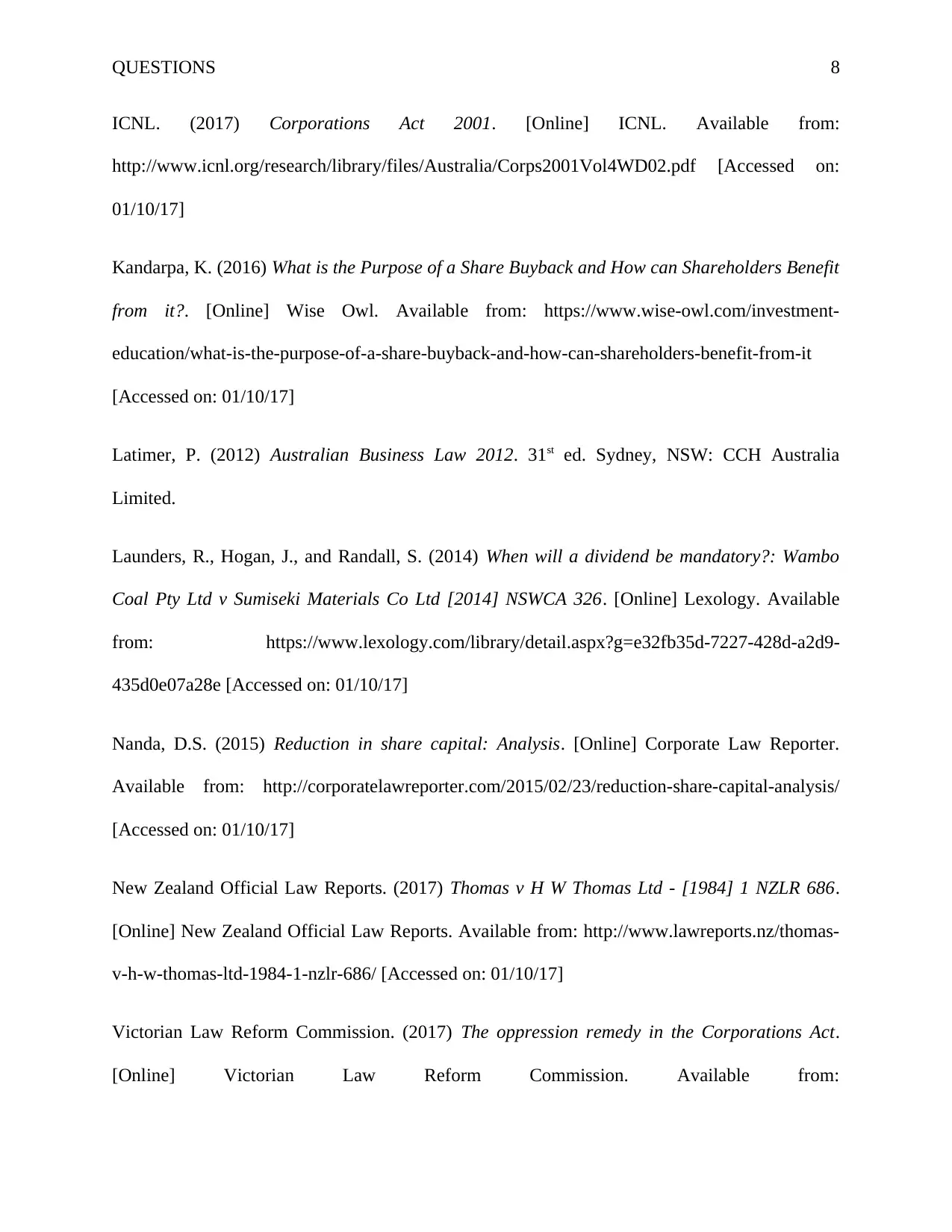
QUESTIONS 8
ICNL. (2017) Corporations Act 2001. [Online] ICNL. Available from:
http://www.icnl.org/research/library/files/Australia/Corps2001Vol4WD02.pdf [Accessed on:
01/10/17]
Kandarpa, K. (2016) What is the Purpose of a Share Buyback and How can Shareholders Benefit
from it?. [Online] Wise Owl. Available from: https://www.wise-owl.com/investment-
education/what-is-the-purpose-of-a-share-buyback-and-how-can-shareholders-benefit-from-it
[Accessed on: 01/10/17]
Latimer, P. (2012) Australian Business Law 2012. 31st ed. Sydney, NSW: CCH Australia
Limited.
Launders, R., Hogan, J., and Randall, S. (2014) When will a dividend be mandatory?: Wambo
Coal Pty Ltd v Sumiseki Materials Co Ltd [2014] NSWCA 326. [Online] Lexology. Available
from: https://www.lexology.com/library/detail.aspx?g=e32fb35d-7227-428d-a2d9-
435d0e07a28e [Accessed on: 01/10/17]
Nanda, D.S. (2015) Reduction in share capital: Analysis. [Online] Corporate Law Reporter.
Available from: http://corporatelawreporter.com/2015/02/23/reduction-share-capital-analysis/
[Accessed on: 01/10/17]
New Zealand Official Law Reports. (2017) Thomas v H W Thomas Ltd - [1984] 1 NZLR 686.
[Online] New Zealand Official Law Reports. Available from: http://www.lawreports.nz/thomas-
v-h-w-thomas-ltd-1984-1-nzlr-686/ [Accessed on: 01/10/17]
Victorian Law Reform Commission. (2017) The oppression remedy in the Corporations Act.
[Online] Victorian Law Reform Commission. Available from:
ICNL. (2017) Corporations Act 2001. [Online] ICNL. Available from:
http://www.icnl.org/research/library/files/Australia/Corps2001Vol4WD02.pdf [Accessed on:
01/10/17]
Kandarpa, K. (2016) What is the Purpose of a Share Buyback and How can Shareholders Benefit
from it?. [Online] Wise Owl. Available from: https://www.wise-owl.com/investment-
education/what-is-the-purpose-of-a-share-buyback-and-how-can-shareholders-benefit-from-it
[Accessed on: 01/10/17]
Latimer, P. (2012) Australian Business Law 2012. 31st ed. Sydney, NSW: CCH Australia
Limited.
Launders, R., Hogan, J., and Randall, S. (2014) When will a dividend be mandatory?: Wambo
Coal Pty Ltd v Sumiseki Materials Co Ltd [2014] NSWCA 326. [Online] Lexology. Available
from: https://www.lexology.com/library/detail.aspx?g=e32fb35d-7227-428d-a2d9-
435d0e07a28e [Accessed on: 01/10/17]
Nanda, D.S. (2015) Reduction in share capital: Analysis. [Online] Corporate Law Reporter.
Available from: http://corporatelawreporter.com/2015/02/23/reduction-share-capital-analysis/
[Accessed on: 01/10/17]
New Zealand Official Law Reports. (2017) Thomas v H W Thomas Ltd - [1984] 1 NZLR 686.
[Online] New Zealand Official Law Reports. Available from: http://www.lawreports.nz/thomas-
v-h-w-thomas-ltd-1984-1-nzlr-686/ [Accessed on: 01/10/17]
Victorian Law Reform Commission. (2017) The oppression remedy in the Corporations Act.
[Online] Victorian Law Reform Commission. Available from:

QUESTIONS 9
http://www.lawreform.vic.gov.au/content/3-oppression-remedy-corporations-act#footnote-
135972-53-backlink [Accessed on: 01/10/17]
WIPO. (2015) Corporations Act 2001. [Online] WIPO. Available from:
http://www.wipo.int/wipolex/en/text.jsp?file_id=370817 [Accessed on: 01/10/17]
http://www.lawreform.vic.gov.au/content/3-oppression-remedy-corporations-act#footnote-
135972-53-backlink [Accessed on: 01/10/17]
WIPO. (2015) Corporations Act 2001. [Online] WIPO. Available from:
http://www.wipo.int/wipolex/en/text.jsp?file_id=370817 [Accessed on: 01/10/17]
⊘ This is a preview!⊘
Do you want full access?
Subscribe today to unlock all pages.

Trusted by 1+ million students worldwide
1 out of 9
Related Documents
Your All-in-One AI-Powered Toolkit for Academic Success.
+13062052269
info@desklib.com
Available 24*7 on WhatsApp / Email
![[object Object]](/_next/static/media/star-bottom.7253800d.svg)
Unlock your academic potential
Copyright © 2020–2026 A2Z Services. All Rights Reserved. Developed and managed by ZUCOL.





